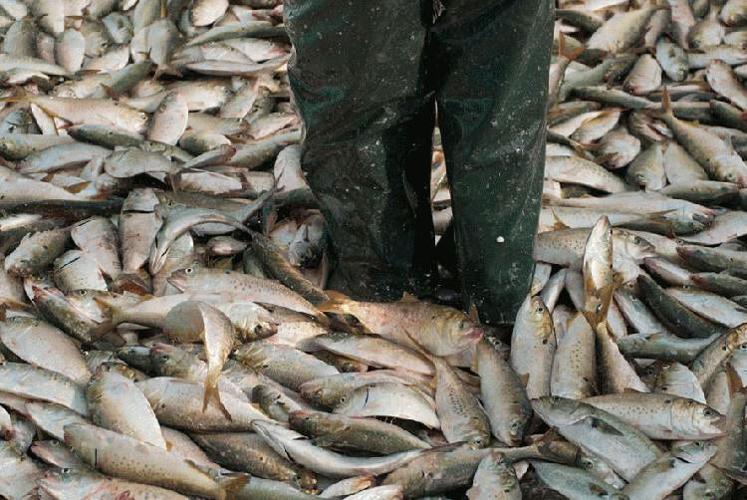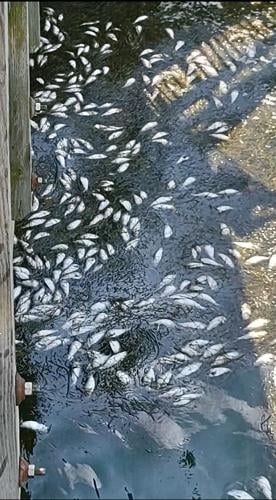Large-scale commercial menhaden fishing will be limited in the Chesapeake Bay, mainly in warm months, under a voluntary agreement announced last week. Recreational anglers and conservationists called it toothless and inadequate.
The 30-vessel fishing fleet working for Omega Protein as well as two other smaller operations signed a memorandum of understanding with the Virginia Marine Resources Commission aimed at limiting the impacts of dead fish spilled from nets and avoiding conflicts with boaters and anglers. Thousands of dead fish from several spills in July 2022 washed ashore at Silver Beach and Kiptopeke State Park on the lower Eastern Shore, prompting a public outcry.

Menhaden are an important food for many fish, birds and marine mammals.
Under the deal, vessels using purse seines to encircle and catch menhaden agreed to stop fishing in the Bay during holidays and weekends from Memorial Day through Labor Day. They also pledged to work at least a half mile away from the Chesapeake Bay Bridge Tunnel year-round, and they vowed to harvest no closer than one mile from shore off Hampton Roads, Virginia Beach and the lower Shore.
The agreement also says the marine resources commission and three fishing operations will develop a protocol for responding rapidly to net spills.
“The new memorandum of understanding successfully addresses concerns that have been raised about how the menhaden fishery can best coexist with other user groups in the Bay,” said Monty Deihl, CEO of Ocean Harvesters. It operates the fishing fleet for Omega Protein, which processes Atlantic menhaden into fish oil and pet food at a “reduction” plant in Reedville, VA. The other vessels catch much smaller amounts of menhaden, mainly to sell for bait.
“This MOU further illustrates that the menhaden fishery will work with the Bay community to alleviate concerns and to remain operating responsibly and sustainably here in Virginia,” Deihl added.

Menhaden are vacuumed from a purse seine onto a boat for transport to the processing plant.
After last year’s net spills by the Ocean Harvesters fleet, more than 10,000 people signed petitions urging Republican Gov. Glenn Youngkin to shut down purse seine fishing for menhaden in the Bay.
The agreement comes four months after the marine resources commission, which manages saltwater fish species and their habitat, rejected a proposed regulation that would have barred fishing within one mile of Virginia’s Bay shoreline and off Virginia Beach and within a half mile of the bridge tunnel. It also would have prohibited fishing for a total of 17 days around the summer holidays.
By a 5–4 vote in December, commissioners opted instead for negotiating a voluntary arrangement.
Recreational fishing and conservation groups criticized the deal, saying it falls short of limiting the harm caused by commercial fishing in the Bay for menhaden, a small, oily fish that is forage for other fish and wildlife species.
Chris Moore, the Chesapeake Bay Foundation’s senior regional ecosystem scientist, said the net spills not only waste a valuable natural resource but are becoming an annual occurrence. Four have been reported on average every year from 2018 through 2021, with the number of dead fish per incident ranging from 5,000 to 300,000, according to the agreement.

Small, oily fish known as menhaden pool up dead along a dock on the Eastern Shore of Virginia in July 2022.
Steve Atkinson, president of the Virginia Saltwater Sportfishing Association, called the agreement a “positive step.” But he pointed out that the one– mile no-fishing buffer doesn’t extend north to the Rappahannock River, an area that he said is popular with anglers.
Critics stressed that unlike the proposed regulation, the deal is unenforceable. Whit Fosburgh, president and CEO of the Theodore Conservation Partnership, said that “this nonbinding framework relies on the state’s ability to trust cosigners to abide by the rules.” Omega’s fishing fleet “hasn’t earned this trust,” he added.
Virginia is the only East Coast state that allows fishing for menhaden to convert the forage fish into fishmeal, fish oil, fertilizer and other products. Omega, a subsidiary of Cooke Inc., based in New Brunswick, Canada, also processes menhaden caught in the Gulf of Mexico.
Annual commercial harvests of menhaden are capped in the Bay at 51,000 metric tons, a limit that Omega’s fishing fleet exceeded in 2019. Even with the cap, anglers and conservationists have long contended that large-scale harvests of menhaden in the Bay deprive other fish and wildlife of an important source of food.
But last year, the Atlantic States Marine Fisheries Commission, which manages migratory species along the East Coast, concluded after a new scientific assessment that menhaden were not being overfished.
Critics say the coastwide assessment failed to account for the importance of menhaden in the Bay, which is a major nursery for recreationally and commercially valuable striped bass, a species that consumes menhaden.
“Science on the menhaden population in the Bay is still lacking,” the Bay Foundation’s Moore said, “and more data is needed to better manage Virginia’s menhaden fishery.”
Conservation and angling groups backed legislation this year that would have directed the Virginia Institute of Marine Science to study the issue. But lawmakers watered that measure down, directing VIMS just to come up with a plan for such a study in the coming year.



(2) comments
Forbid menhaden fishing in all of the Chesapeake Bay and there would be no need to set per day catch limits on strippers. They would thrive as they once did before the advent of the Omega plant. Thousands of new jobs would be created to replace the 235 jobs that Omega claims. Furthermore, Omega would not loose any jobs as they would continue to fish the Eastern Ocean shore as required by all coastal states except Virginia.
These "limitations" are simply a public relations ruse by Omega and they are not really conceeding anything. Over 11,000 signatures were on a petition submitted to Gov. Youngkin by the Virginia Saltwater Sportfishing Association requesting that the reduction fishing in the Chesapeake Bay waters be shut down. This was after two net spills had occurred which were highly publicized at the time and which shut down some popular recreational beaches during the height of the tourist season. One might say those net spills created quite a stink.
The agreeement to not fish for menhaden within a half mile of the recreational beaches and not to fish on weekends and major holidays during the tourist season is simply a recognition by Omega that it is not a good idea to allow the public to see just how devastating a purse seine can be in harvesting a very large school of fish, and to keep the occurence of those spills as well as the envoronmental impact of them out of the public eye.
One should also bear in mind that Omega Protein only employs about 235 individuals in Virginia,. And since the Virginia facility processes almost 71% of the total allowable catch for Menhaden for the entire Atlantic coast, and the Reedville, VA plant is the only Omega reduction facility along the Atlantc coast it is not clear how many, if any, of those jobs would go away if reduction fishery harvest of menhaden were to be eliminated in the waters of the bay.
Welcome to the discussion.
Log In
We aim to provide a forum for fair and open dialogue.
Please use language that is accurate and respectful.
Comments may not include:
* Insults, verbal attacks or degrading statements
* Explicit or vulgar language
* Information that violates a person's right to privacy
* Advertising or solicitations
* Misrepresentation of your identity or affiliation
* Incorrect, fraudulent or misleading content
* Spam or comments that do not pertain to the posted article
We reserve the right to edit or decline comments that do follow these guidelines.